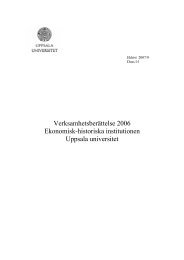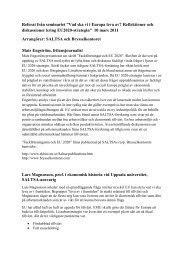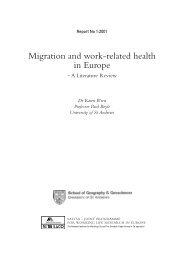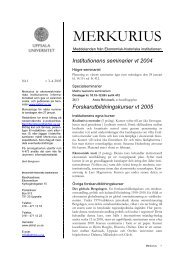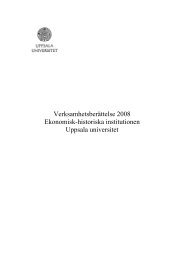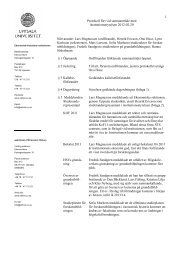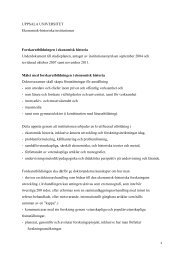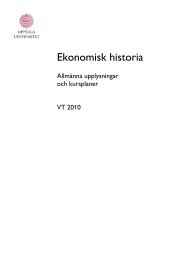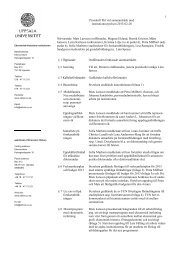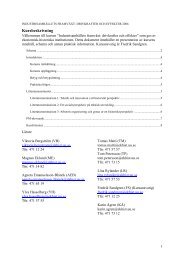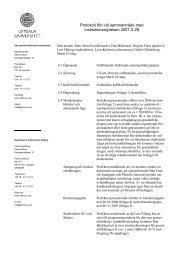ETUC Resolution: More investment in lifelong learning for quality jobs
ETUC Resolution: More investment in lifelong learning for quality jobs
ETUC Resolution: More investment in lifelong learning for quality jobs
Create successful ePaper yourself
Turn your PDF publications into a flip-book with our unique Google optimized e-Paper software.
<strong>ETUC</strong> <strong>Resolution</strong>: <strong>More</strong> <strong><strong>in</strong>vestment</strong> <strong>in</strong> <strong>lifelong</strong> learn<strong>in</strong>g <strong>for</strong> <strong>quality</strong><br />
<strong>jobs</strong><br />
Adopted at the Executive Committee on 1-2 December 2010<br />
The European Union needs a paradigm shift. The model of ‘free and deregulated’<br />
markets pushed <strong>for</strong>wards by Member States compet<strong>in</strong>g with each other <strong>in</strong> the<br />
European <strong>in</strong>ternal market place has failed us. What we need <strong>in</strong>stead is a greater<br />
emphasis on European cooperation on <strong>quality</strong> <strong>jobs</strong>, common susta<strong>in</strong>able <strong>in</strong>dustrial<br />
policies, a more substantial European budget, moves towards an economic union<br />
alongside a monetary union, and common European approaches to f<strong>in</strong>ancial<br />
regulation.<br />
In order to contribute to a greater emphasis on European cooperation on <strong>quality</strong> <strong>jobs</strong><br />
<strong>for</strong> both work<strong>in</strong>g men and women, the <strong>ETUC</strong> supports the goals of European<br />
education and tra<strong>in</strong><strong>in</strong>g policies which promote flexibility between academic and<br />
vocational pathways. The <strong>ETUC</strong> is conv<strong>in</strong>ced that learn<strong>in</strong>g without sett<strong>in</strong>g appropriate<br />
socio-political objectives will ultimately fail and so calls on the EU, Member States and<br />
employers throughout Europe to <strong>in</strong>vest more <strong>in</strong> <strong>lifelong</strong> learn<strong>in</strong>g.<br />
1. Context<br />
Europe’s social and economic well-be<strong>in</strong>g is dependent on hav<strong>in</strong>g a well educated and highly<br />
skilled population, and education and tra<strong>in</strong><strong>in</strong>g play an essential role <strong>in</strong> giv<strong>in</strong>g citizens the<br />
knowledge, skills and competences they need to participate fully <strong>in</strong> society and the economy.<br />
Global competition, demographic developments, technological progress, climate change<br />
obligations and shifts <strong>in</strong> patterns of employment <strong>in</strong>dividually and collectively are hav<strong>in</strong>g a<br />
dramatic impact on labour markets and the need <strong>for</strong> new knowledge, skills and competences.<br />
If the EU is to meet these challenges, it will need to create more and better <strong>jobs</strong> and enable<br />
work<strong>in</strong>g men and women to improve their skills and more specifically match them to shortterm<br />
and long-term labour market demand.<br />
The alarm<strong>in</strong>g nature of the f<strong>in</strong>ancial and economic crisis has led many Member States to<br />
<strong>in</strong>troduce a series of austerity measures and reduce public sector fund<strong>in</strong>g, which <strong>in</strong> turn has<br />
led to the further loss of <strong>jobs</strong> and <strong>in</strong>security <strong>for</strong> millions of men and women, particularly those<br />
on temporary or part-time contracts and engaged <strong>in</strong> seasonal work, adds a <strong>for</strong>midable<br />
supplementary challenge.<br />
Global competition and company restructur<strong>in</strong>g have led to the loss of employment <strong>in</strong><br />
manufactur<strong>in</strong>g <strong>in</strong>dustries <strong>in</strong> the European Union, particularly amongst the low skilled. The<br />
situation is evolv<strong>in</strong>g dramatically however, and emerg<strong>in</strong>g countries have recognised the need<br />
<strong>ETUC</strong>/EC190/JM/JB/hb-23/11/2010
to <strong>in</strong>vest heavily <strong>in</strong> upgrad<strong>in</strong>g their own skills base. Ch<strong>in</strong>a, <strong>for</strong> example, is putt<strong>in</strong>g a priority on<br />
the development of the highly skilled and is produc<strong>in</strong>g significantly more researchers per year<br />
than the EU (+9.9 % per annum <strong>for</strong> Ch<strong>in</strong>a and +3.1 % per annum <strong>for</strong> the EU over the period<br />
2000 to 2006), and co<strong>in</strong>cidentally it has become the largest exporter of high-tech products <strong>in</strong><br />
the world due to the growth of its computers and office mach<strong>in</strong>ery exports. (A more research<strong>in</strong>tensive<br />
and <strong>in</strong>tegrated European Research Area - Science, Technology and Competitiveness -<br />
key figures report 2008/2009).<br />
Significant demographic developments are tak<strong>in</strong>g place. Accord<strong>in</strong>g to Cedefop figures, the<br />
work<strong>for</strong>ce will be gett<strong>in</strong>g older <strong>in</strong> the decade lead<strong>in</strong>g up to 2020, and ‘only the number of 45-<br />
54 and 55-64 year olds will <strong>in</strong>crease… Cont<strong>in</strong>uous ef<strong>for</strong>ts to <strong>in</strong>crease labour market<br />
participation, <strong>in</strong> particular of women and older people, are needed to keep the decl<strong>in</strong>e <strong>in</strong> the<br />
labour <strong>for</strong>ce lower than that of the population’. (Skills supply and demand <strong>in</strong> Europe –<br />
Medium term <strong>for</strong>ecast up to 2020).<br />
Technological progress, particularly <strong>in</strong> the <strong>for</strong>m of new <strong>in</strong><strong>for</strong>mation and communication<br />
technologies, biotechnologies and nanotechnologies, has already led to the redundancy of<br />
certa<strong>in</strong> skills and the launch<strong>in</strong>g of new knowledge-based <strong>in</strong>dustries that require a highly<br />
skilled work <strong>for</strong>ce.<br />
Meet<strong>in</strong>g climate change obligations through susta<strong>in</strong>able development has significant potential<br />
<strong>for</strong> the creation of new <strong>jobs</strong>, which <strong>in</strong> turn will require the improvement of exist<strong>in</strong>g skills,<br />
requir<strong>in</strong>g workers to become familiar with new practices and techniques that will enable them<br />
to work <strong>in</strong> a low-carbon economy.<br />
Patterns of employment are cont<strong>in</strong>ually chang<strong>in</strong>g, with the gradual but constant decl<strong>in</strong>e of<br />
employment <strong>in</strong> the primary sector and manufactur<strong>in</strong>g and the constant <strong>in</strong>crease <strong>in</strong><br />
employment <strong>in</strong> the service sector. Cedefop figures show that by 2020 a further 2.5 million <strong>jobs</strong><br />
will be lost <strong>in</strong> the primary sector and a further 2 million <strong>in</strong> manufactur<strong>in</strong>g and production<br />
<strong>in</strong>dustries. Growth <strong>in</strong> employment will lie <strong>in</strong> the service sector, and there will be a shift <strong>in</strong><br />
demand towards more skilled workers. ‘As a result, demand <strong>for</strong> highly-qualified people is<br />
projected to rise by almost 16 million. Demand <strong>for</strong> people with medium-level qualifications is<br />
projected to rise by more than 3.5 million. Conversely, demand <strong>for</strong> low-skilled workers is<br />
expected to decrease by around 12 million’.<br />
All these changes are tak<strong>in</strong>g place at a time of great economic uncerta<strong>in</strong>ty and at a time of<br />
high unemployment. The latest Eurostat figures (31 August 2010) show that just over 23 million<br />
men and women were now <strong>for</strong>mally recognised as unemployed with<strong>in</strong> the EU, an <strong>in</strong>crease of<br />
just over a million compared with July 2009 figures – that is 10% of the work<strong>in</strong>g population <strong>in</strong><br />
2010 as compared with 9.6% the previous year. The lowest employment rate was to be found<br />
<strong>in</strong> Austria (3.8%) and the Netherlands (4.4%) and the highest <strong>in</strong> Spa<strong>in</strong> (20.3%). The<br />
unemployment rate <strong>for</strong> men rose from 9.2% to 9.6% dur<strong>in</strong>g this period and <strong>for</strong> women from<br />
9.0% to 9.6%. The most shock<strong>in</strong>g figures relate to the unemployment rate of young people<br />
(under 25s) - 20.2%, with a figure of 8.1% <strong>in</strong> the Netherlands and 41.5% <strong>in</strong> Spa<strong>in</strong>. As <strong>in</strong> previous<br />
downturns, young people are the hardest hit, and the NEET group (not <strong>in</strong> education,<br />
employment or tra<strong>in</strong><strong>in</strong>g) is set to grow, and their employment must be a priority.<br />
Because of the alarm<strong>in</strong>g f<strong>in</strong>ancial and economic crisis, the potential <strong>for</strong> job growth over the<br />
next ten years is poor at best. Cedefop figures <strong>for</strong>ecast that the situation will only marg<strong>in</strong>ally<br />
improve over the next ten years. Demand <strong>for</strong> labour should <strong>in</strong>crease by 0.3% per annum over<br />
the next ten years, but the 2008 figure will most likely not be reached.<br />
<strong>ETUC</strong>/EC190/JM/JB/hb-23/11/2010<br />
2
2. The EU response<br />
The EU response to this f<strong>in</strong>ancial and economic crisis has been to move from the Lisbon<br />
Strategy, whose professed aim was <strong>for</strong> the EU ‘to become the most dynamic and competitive<br />
knowledge-based economy <strong>in</strong> the world by 2010 capable of susta<strong>in</strong>able economic growth with<br />
more and better <strong>jobs</strong> and greater social cohesion and respect <strong>for</strong> the environment’, to another<br />
10-year <strong>in</strong>itiative Europe 2020 – A European strategy <strong>for</strong> smart, susta<strong>in</strong>able and <strong>in</strong>clusive<br />
growth. It proposes 5 headl<strong>in</strong>e targets <strong>for</strong> 2020, two of which are directly l<strong>in</strong>ked to education<br />
and tra<strong>in</strong><strong>in</strong>g and labour market policy:<br />
<br />
<br />
75% of the population aged 20-64 should be employed<br />
The share of early school leavers should be under 10% and at least 40 % of the younger<br />
generation should have a tertiary degree.<br />
As th<strong>in</strong>gs stand at the moment the EU average figures <strong>for</strong> 2009 were, as follows:<br />
<br />
<br />
69.1% of the population aged 20-64 is employed (75.8% of men and 62.5% of women)<br />
The share of early school leavers is 14.4% (16.3% men and 10.7% women), and 32.3% of<br />
the younger generation has a tertiary degree (28.9% men and 35.2% women).<br />
Some countries are already hitt<strong>in</strong>g these targets, but <strong>for</strong> others a vast ef<strong>for</strong>t will be required.<br />
In order to meet these global targets the EU is propos<strong>in</strong>g seven flagship <strong>in</strong>itiatives, two of<br />
which are directly l<strong>in</strong>ked to education and tra<strong>in</strong><strong>in</strong>g and the labour market, ‘An Agenda <strong>for</strong><br />
New Skills and Jobs’ and ‘Youth on the Move’.<br />
The professed aim of ‘An Agenda <strong>for</strong> new skills and <strong>jobs</strong>’ is ‘to create conditions <strong>for</strong><br />
modernis<strong>in</strong>g labour markets with a view to rais<strong>in</strong>g employment levels and ensur<strong>in</strong>g the<br />
susta<strong>in</strong>ability of our social models. This means empower<strong>in</strong>g people through the acquisition of<br />
new skills to enable our current and future work<strong>for</strong>ce to adapt to new conditions and potential<br />
career shifts, reduce unemployment and raise labour productivity’. One element will be the<br />
launch<strong>in</strong>g of the European Taxonomy of Skills, Competences and Occupations (ESCO).<br />
The professed aim of ‘Youth on the Move’ is ‘to enhance the per<strong>for</strong>mance and <strong>in</strong>ternational<br />
attractiveness of Europe's higher education <strong>in</strong>stitutions and raise the overall <strong>quality</strong> of all<br />
levels of education and tra<strong>in</strong><strong>in</strong>g <strong>in</strong> the EU, comb<strong>in</strong><strong>in</strong>g both excellence and equity, by<br />
promot<strong>in</strong>g student mobility and tra<strong>in</strong>ees' mobility, and improve the employment situation of<br />
young people’.<br />
The EU has entered a new stage of the Copenhagen Process, whose aim has been to encourage<br />
more citizens to make wider use of vocational learn<strong>in</strong>g opportunities, whether at school, <strong>in</strong><br />
higher education, <strong>in</strong> the workplace, or through private courses. From Copenhagen to<br />
Maastricht, Hels<strong>in</strong>ki and Bordeaux, a European vocational and education tra<strong>in</strong><strong>in</strong>g area has<br />
been built. The next step will be the adoption <strong>in</strong> December 2010 of the Bruges Communiqué<br />
on the future priorities <strong>for</strong> enhanced European cooperation <strong>in</strong> vocational education and<br />
tra<strong>in</strong><strong>in</strong>g. The EU has also produced a Communication ‘A New Impetus <strong>for</strong> European<br />
Cooperation <strong>in</strong> Vocational Education and Tra<strong>in</strong><strong>in</strong>g to support the Europe 2020 Strategy’.<br />
The EU has moved from a ‘learn<strong>in</strong>g process’ approach to a ‘learn<strong>in</strong>g outcomes’ approach,<br />
based on what learners are expected to know, understand and be able to do, and has moved<br />
<strong>for</strong>ward with the implementation of the European Qualifications Framework (EQF)<br />
http://ec.europa.eu/education/<strong>lifelong</strong>-learn<strong>in</strong>g-policy/doc44_en.htm,<br />
EUROPASS<br />
http://europass.cedefop.europa.eu/, the European Credit Transfer and Accumulation System<br />
<strong>ETUC</strong>/EC190/JM/JB/hb-23/11/2010<br />
3
(ECTS) http://ec.europa.eu/education/<strong>lifelong</strong>-learn<strong>in</strong>g-policy/doc48_en.htm, the European<br />
Credit System <strong>for</strong> Vocational Education and Tra<strong>in</strong><strong>in</strong>g (ECVET)<br />
http://ec.europa.eu/education/<strong>lifelong</strong>-learn<strong>in</strong>g-policy/doc50_en.htm and the European<br />
Quality Assurance Reference Framework <strong>for</strong> Vocational Education and Tra<strong>in</strong><strong>in</strong>g (EQAVET)<br />
http://www.eqavet.eu/gns/home.aspx . The EU is also <strong>in</strong> the process of modernis<strong>in</strong>g the<br />
Professional Qualifications Directive (2005/36/EC).<br />
In parallel EU Member States, <strong>in</strong> conjunction with another 20 countries, have launched the<br />
European Higher Education Area (EHEA), previously known as the ‘Bologna Process', <strong>in</strong><br />
March 2010, to ensure more comparable, compatible and coherent systems of higher<br />
education <strong>in</strong> Europe.<br />
3. The <strong>ETUC</strong> response<br />
The Worsen<strong>in</strong>g Crisis – Europe at Risk was the subject of a resolution adopted at the <strong>ETUC</strong><br />
Executive Committee <strong>in</strong> June 2010. http://www.etuc.org/a/7373<br />
The Europe 2020 strategy has also been the subject of a jo<strong>in</strong>t statement with<br />
BUSINESSEUROPE, CEEP and UEAPME. In this statement the <strong>ETUC</strong> and the employers’<br />
organisations underl<strong>in</strong>e, <strong>in</strong>ter alia, the importance of promot<strong>in</strong>g the knowledge triangle<br />
(education, research, <strong>in</strong>novation). http://www.etuc.org/a/7327<br />
Europe must further strengthen its potential <strong>in</strong> terms of skilled workers, science, research and<br />
technology and thus its capacity to <strong>in</strong>novate as a key element of competitiveness. In any case,<br />
the knowledge triangle must rema<strong>in</strong> at the heart of the EU2020 strategy. In this context the<br />
notion of <strong>in</strong>novation has to be widened to all k<strong>in</strong>d of non-technological <strong>in</strong>novation <strong>in</strong>clud<strong>in</strong>g<br />
"social <strong>in</strong>novation" <strong>in</strong> order to <strong>in</strong>crease social capital which is important <strong>for</strong> both<br />
competitiveness and social cohesion. Insufficient <strong><strong>in</strong>vestment</strong> <strong>in</strong> <strong>in</strong>novation and further education<br />
is exacerbat<strong>in</strong>g economic problems and affect<strong>in</strong>g labour productivity.<br />
Look<strong>in</strong>g ahead, our work patterns are chang<strong>in</strong>g. So are employers’ needs <strong>for</strong> skills <strong>in</strong> the work<br />
<strong>for</strong>ce and the needs of workers to comb<strong>in</strong>e productive employment with family life and personal<br />
development. Europe must not only upgrade and update skills levels; it must also make sure that<br />
workers have the skills that are needed on the labour market and that these skills are fully used<br />
<strong>in</strong> high-<strong>quality</strong> <strong>jobs</strong>.<br />
Comprehensive <strong>lifelong</strong> learn<strong>in</strong>g strategies are required to ensure employability of workers. It is<br />
important to establish effective concepts <strong>for</strong> <strong>in</strong>itial and further tra<strong>in</strong><strong>in</strong>g, create <strong>jobs</strong>, not least <strong>for</strong><br />
those who are excluded from the labour market due to, <strong>for</strong> example, shortcom<strong>in</strong>gs <strong>in</strong> their<br />
education, and to take effective steps to remove discrim<strong>in</strong>ation as far as access to and rema<strong>in</strong><strong>in</strong>g<br />
<strong>in</strong> the labour market are concerned. Well educated workers and the capacity to <strong>in</strong>novate are key<br />
elements of competition and a prerequisite <strong>for</strong> prosperity. This is <strong>in</strong>dispensable <strong>for</strong> the creation<br />
of productive and highly-skilled <strong>jobs</strong>.<br />
Prior to this, the <strong>ETUC</strong> Executive Committee passed a resolution <strong>in</strong> March 2009 on <strong>in</strong>itial and<br />
cont<strong>in</strong>uous vocational tra<strong>in</strong><strong>in</strong>g <strong>for</strong> a European employment strategy.<br />
http://www.etuc.org/a/6078<br />
The <strong>ETUC</strong> also signed a Framework Agreement on Inclusive Labour Markets with<br />
BUSINESSEUROPE, CEEP and UEAPME <strong>in</strong> March 2010. http://www.etuc.org/a/7076<br />
<strong>ETUC</strong>/EC190/JM/JB/hb-23/11/2010<br />
4
In this agreement the <strong>ETUC</strong> and the employers’ organisations agree that ‘labour market<br />
<strong>in</strong>clusion is an essential condition <strong>for</strong> cohesion, <strong>in</strong>clud<strong>in</strong>g the fight aga<strong>in</strong>st poverty, and<br />
economic success’. They recognise, <strong>in</strong>ter alia, that ‘they have a responsibility to deepen their<br />
reflections and engage themselves to f<strong>in</strong>d solutions and mobilise their members.’ An emphasis<br />
was put upon the follow<strong>in</strong>g, <strong>in</strong>ter alia:<br />
<br />
<br />
<br />
<br />
‘cooperat<strong>in</strong>g with education and tra<strong>in</strong><strong>in</strong>g systems <strong>in</strong> order to better match the needs of<br />
the <strong>in</strong>dividual and those of the labour market, <strong>in</strong>clud<strong>in</strong>g by tackl<strong>in</strong>g the problems of basic<br />
skills (literacy and numeracy), promot<strong>in</strong>g vocational education and tra<strong>in</strong><strong>in</strong>g and<br />
measures to ease the transition between education and the labour market’<br />
<strong>in</strong>troduc<strong>in</strong>g <strong>in</strong>dividual competence development plans (<strong>in</strong> l<strong>in</strong>e with the framework of<br />
actions <strong>for</strong> the <strong>lifelong</strong> development of competences and qualifications) jo<strong>in</strong>tly<br />
elaborated by the employer and the worker, tak<strong>in</strong>g <strong>in</strong>to account the specific situation of<br />
the employer, particularly SMEs, and worker. These plans identify the required<br />
competences of the worker <strong>in</strong> a given work situation; and, with shared responsibilities<br />
accord<strong>in</strong>g to the <strong>in</strong>dividual situation, actions to develop the worker’s competences<br />
improv<strong>in</strong>g transparency and transferability, both <strong>for</strong> the worker and <strong>for</strong> the entreprise, <strong>in</strong><br />
order to facilitate geographical and occupational mobility and to <strong>in</strong>crease the efficiency<br />
of labour markets<br />
o by promot<strong>in</strong>g the development of means of recognition and validation of<br />
competences<br />
o by improv<strong>in</strong>g the transferability of qualifications to ensure transitions to<br />
employment<br />
promot<strong>in</strong>g more and better apprenticeship and tra<strong>in</strong>eeship contracts’.<br />
4. The <strong>ETUC</strong> <strong>lifelong</strong> learn<strong>in</strong>g agenda<br />
The <strong>ETUC</strong> <strong>lifelong</strong> learn<strong>in</strong>g agenda has the follow<strong>in</strong>g key po<strong>in</strong>ts:<br />
1/Support<strong>in</strong>g top <strong>quality</strong> <strong>in</strong>itial education<br />
Education is a fundamental human right and essential <strong>for</strong> the exercise of all other human<br />
rights. Initial education is not only important <strong>for</strong> personal development but it also lays the<br />
basis <strong>for</strong> active citizenship, <strong>for</strong> social <strong>in</strong>clusion and <strong>for</strong> success <strong>in</strong> the labour market. The latest<br />
OECD survey notes that ‘education plays a major role <strong>in</strong> keep<strong>in</strong>g <strong>in</strong>dividuals <strong>in</strong> the labour<br />
<strong>for</strong>ce longer’ and that ‘people with higher levels of education have a better chance of f<strong>in</strong>d<strong>in</strong>g<br />
and keep<strong>in</strong>g a job’. (Education at a Glance 2010). Educational atta<strong>in</strong>ment is even positively<br />
associated with self-reported good health.<br />
Top <strong>quality</strong> <strong>in</strong>itial education provides a fundamental start <strong>in</strong> life, and the <strong>ETUC</strong> calls on<br />
Member States to support publicly funded and properly regulated <strong>in</strong>stitutions of <strong>in</strong>itial<br />
education, cover<strong>in</strong>g pre-primary, primary and secondary schools, vocational tra<strong>in</strong><strong>in</strong>g and<br />
tertiary education, with well qualified and well tra<strong>in</strong>ed teach<strong>in</strong>g and support staff on good pay<br />
and conditions.<br />
In the light of the Europe 2020 strategy the <strong>ETUC</strong> calls on the EU to propose a<br />
Recommendation <strong>for</strong> reduc<strong>in</strong>g the numbers of early school leavers based on prevention,<br />
<strong>in</strong>tervention and compensation and also a Recommendation <strong>for</strong> achiev<strong>in</strong>g the 40 % figure <strong>for</strong><br />
the younger generation with a tertiary degree.<br />
<strong>ETUC</strong>/EC190/JM/JB/hb-23/11/2010<br />
5
2/Enabl<strong>in</strong>g equal access to education and tra<strong>in</strong><strong>in</strong>g<br />
Equal access to <strong>in</strong>itial education and tra<strong>in</strong><strong>in</strong>g is essential to launch citizens on their way, but<br />
equal access to cont<strong>in</strong>u<strong>in</strong>g education and tra<strong>in</strong><strong>in</strong>g is essential to respond to citizens’ chang<strong>in</strong>g<br />
circumstances and aspirations on the one hand and the needs of the labour market on the<br />
other.<br />
The <strong>ETUC</strong> considers that all workers should have equal access to education and tra<strong>in</strong><strong>in</strong>g at all<br />
levels, regardless of their age, gender, employment status, or nationality, and particularly<br />
groups with low participation, such as the low-skilled, older workers and workers on<br />
temporary or part-time contracts, so that they are able to acquire, update and develop their<br />
knowledge, skills and competences throughout their lifetime. Those that need tra<strong>in</strong><strong>in</strong>g the<br />
most should not be the least likely to obta<strong>in</strong> it.<br />
The <strong>ETUC</strong> calls on the EU to underp<strong>in</strong> this access with a workers’ right to tra<strong>in</strong><strong>in</strong>g.<br />
The <strong>ETUC</strong> considers that employers, and particularly SMEs, should support <strong>lifelong</strong> learn<strong>in</strong>g<br />
<strong>in</strong>itiatives by mak<strong>in</strong>g learn<strong>in</strong>g more accessible dur<strong>in</strong>g work<strong>in</strong>g hours, and better suited to<br />
workers’ needs, either through the <strong>in</strong>dividualisation of learn<strong>in</strong>g plans, the shift to<br />
competence-based tra<strong>in</strong><strong>in</strong>g, the move to modularisation or the use of distance learn<strong>in</strong>g.<br />
3/Recognis<strong>in</strong>g and validat<strong>in</strong>g non-<strong>for</strong>mal and <strong>in</strong><strong>for</strong>mal learn<strong>in</strong>g<br />
Participation <strong>in</strong> non-<strong>for</strong>mal and <strong>in</strong><strong>for</strong>mal learn<strong>in</strong>g after leav<strong>in</strong>g <strong>in</strong>itial education is essential <strong>for</strong><br />
citizens, both men and women, to improve their knowledge, skills and competences. The<br />
validation of non-<strong>for</strong>mal and <strong>in</strong><strong>for</strong>mal learn<strong>in</strong>g provides opportunities <strong>for</strong> <strong>in</strong>tegration <strong>in</strong>to<br />
society <strong>in</strong> general and <strong>in</strong>to the labour market <strong>in</strong> particular. It helps reduce the possibility of<br />
unemployment <strong>for</strong> those that have the skills but not the paper qualifications. It avoids<br />
repetition of learn<strong>in</strong>g which has already been done.<br />
The <strong>ETUC</strong> calls on the EU to put <strong>for</strong>ward a Recommendation, with full <strong>in</strong>volvement of the<br />
social partners at European and national level, on the validation of non-<strong>for</strong>mal and <strong>in</strong><strong>for</strong>mal<br />
learn<strong>in</strong>g which improves validation practices, where they exist, and which <strong>in</strong>troduces new<br />
legal structures and policy frameworks to support non-<strong>for</strong>mal and <strong>in</strong><strong>for</strong>mal learn<strong>in</strong>g, where<br />
they do not.<br />
The <strong>ETUC</strong> calls on Member States to consider ways <strong>in</strong> which the validation of non-<strong>for</strong>mal and<br />
<strong>in</strong><strong>for</strong>mal learn<strong>in</strong>g can be <strong>in</strong>tegrated <strong>in</strong>to National Qualification Frameworks and to establish<br />
rigorous and credible <strong>in</strong>struments with social partners <strong>for</strong> the recognition and transferability<br />
of skills obta<strong>in</strong>ed via non-<strong>for</strong>mal and <strong>in</strong><strong>for</strong>mal learn<strong>in</strong>g.<br />
The <strong>ETUC</strong> calls on employers to exam<strong>in</strong>e ways of recognis<strong>in</strong>g the validation of non-<strong>for</strong>mal and<br />
<strong>in</strong><strong>for</strong>mal <strong>in</strong> the workplace, by means of career development and salary <strong>in</strong>creases.<br />
4/Eas<strong>in</strong>g the transition from <strong>in</strong>itial education to work<strong>in</strong>g life<br />
If work<strong>in</strong>g men and women are to take advantage of employment opportunities, both<br />
nationally and Europe-wide, they need to have the right knowledge, skills and competences<br />
and to match them to labour market needs. They need a comb<strong>in</strong>ation of transversal core skills<br />
with the specific skills needed <strong>for</strong> a job on the basis of <strong>in</strong>itial education and vocational tra<strong>in</strong><strong>in</strong>g<br />
and they need to develop them further throughout their work<strong>in</strong>g lives on the basis of<br />
<strong>ETUC</strong>/EC190/JM/JB/hb-23/11/2010<br />
6
cont<strong>in</strong>u<strong>in</strong>g vocational tra<strong>in</strong><strong>in</strong>g and adult education. For this they need to be able to move<br />
flexibly between academic and vocational pathways. They also need to know which <strong>jobs</strong> are<br />
available and what skills are needed, or will be needed and recognised to carry them out.<br />
The <strong>ETUC</strong> calls on the EU and Member States to cont<strong>in</strong>ue to <strong>in</strong>vest <strong>in</strong> socio-economic<br />
research and to develop more reliable systems <strong>for</strong> the anticipation of future skill needs and<br />
skill shortages, with the active participation of social partners. The fruits of this research need<br />
to be dissem<strong>in</strong>ated <strong>in</strong> a clear and user-friendly way.<br />
The <strong>ETUC</strong> calls on Member States and employers to make greater provision <strong>for</strong> fully-funded<br />
on-the-job tra<strong>in</strong><strong>in</strong>g and apprenticeships.<br />
The <strong>ETUC</strong> calls on Member States to develop greater permeability and mobility between<br />
academic and vocational education systems with<strong>in</strong> the context of National Qualifications<br />
Frameworks.<br />
F<strong>in</strong>ally the <strong>ETUC</strong> calls on Member States to establish <strong>in</strong>tegrated guidance and counsell<strong>in</strong>g<br />
services and efficient job placement services which are closely l<strong>in</strong>ked to the needs of the<br />
labour market.<br />
5/Provid<strong>in</strong>g adequate and targeted fund<strong>in</strong>g <strong>for</strong> top <strong>quality</strong> education and tra<strong>in</strong><strong>in</strong>g<br />
Europe’s social and economic well-be<strong>in</strong>g is dependent on hav<strong>in</strong>g a population that is highly<br />
qualified and able to understand the world <strong>in</strong> which we live, and this requires adequate and<br />
targeted fund<strong>in</strong>g. It is counter-productive <strong>for</strong> European governments to cut fund<strong>in</strong>g <strong>for</strong><br />
education and tra<strong>in</strong><strong>in</strong>g dur<strong>in</strong>g the f<strong>in</strong>ancial and economic crisis, as a grow<strong>in</strong>g economy is<br />
dependent on the supply of highly skilled workers and on the mobilisation of the skills and<br />
competences of the unemployed. Employers are constantly on the lookout <strong>for</strong> skilled work<strong>in</strong>g<br />
men and women, and they need to recognise their own responsibilities and treat cont<strong>in</strong>u<strong>in</strong>g<br />
vocational tra<strong>in</strong><strong>in</strong>g as an <strong><strong>in</strong>vestment</strong> <strong>for</strong> development <strong>in</strong> the long term.<br />
The <strong>ETUC</strong> demands that Member States do not take advantage of the f<strong>in</strong>ancial and economic<br />
crisis to make public spend<strong>in</strong>g cuts which will have a deleterious impact on the provision of<br />
top <strong>quality</strong> education and tra<strong>in</strong><strong>in</strong>g.<br />
The <strong>ETUC</strong> calls on Member States and employers to <strong>in</strong>vest <strong>in</strong> work<strong>in</strong>g men and women and to<br />
<strong>in</strong>crease expenditure per employee <strong>for</strong> cont<strong>in</strong>u<strong>in</strong>g vocational tra<strong>in</strong><strong>in</strong>g.<br />
6/Participat<strong>in</strong>g <strong>in</strong> social dialogue on <strong>lifelong</strong> learn<strong>in</strong>g<br />
Trade union participation <strong>in</strong> social dialogue on <strong>lifelong</strong> learn<strong>in</strong>g is a key element <strong>for</strong> the<br />
successful design, management, monitor<strong>in</strong>g and assessment of public policies and of national<br />
and EU vocational tra<strong>in</strong><strong>in</strong>g systems. In this way tra<strong>in</strong><strong>in</strong>g programmes that emanate from this<br />
process correspond to the needs of the labour market but also to the needs of work<strong>in</strong>g men<br />
and women.<br />
The <strong>ETUC</strong> calls on the EU and Member States to support the participation of trade unions <strong>in</strong><br />
this process of tri-partite social dialogue on <strong>lifelong</strong> learn<strong>in</strong>g at all levels.<br />
<strong>ETUC</strong>/EC190/JM/JB/hb-23/11/2010<br />
7
The <strong>ETUC</strong> calls on the European Commission to set up European sector skills councils with<strong>in</strong><br />
the context of the ‘An Agenda <strong>for</strong> new skills and <strong>jobs</strong>’ as a means of support <strong>for</strong> European<br />
Social Dialogue.<br />
The <strong>ETUC</strong> calls on employers at all levels (European, national, regional and workplace) to<br />
recognise that trade union organisations and employers have shared <strong>in</strong>terests <strong>in</strong> terms of the<br />
development of a highly skilled work <strong>for</strong>ce and to engage <strong>in</strong> a process of collective barga<strong>in</strong><strong>in</strong>g<br />
and/or social dialogue with trade unions, particularly at the workplace with union<br />
representatives and union learn<strong>in</strong>g representatives, on the subject of cont<strong>in</strong>u<strong>in</strong>g vocational<br />
tra<strong>in</strong><strong>in</strong>g.<br />
7/Mak<strong>in</strong>g the best of European education and tra<strong>in</strong><strong>in</strong>g <strong>in</strong>itiatives and <strong>in</strong>struments<br />
The EU is <strong>in</strong> the process of implement<strong>in</strong>g a series of <strong>in</strong>itiatives, the European Qualifications<br />
Framework (EQF), EUROPASS, the European Credit Transfer and Accumulation System<br />
(ECTS), the European Credit System <strong>for</strong> Vocational Education and Tra<strong>in</strong><strong>in</strong>g (ECVET) and the<br />
European Quality Assurance Reference Framework <strong>for</strong> Vocational Education and Tra<strong>in</strong><strong>in</strong>g<br />
(EQAVET), and <strong>in</strong> the process of modernis<strong>in</strong>g the Professional Qualifications Directive<br />
(2005/36/EC)<br />
The EU has a number of <strong>in</strong>struments <strong>for</strong> support<strong>in</strong>g education and tra<strong>in</strong><strong>in</strong>g activities. On the<br />
one hand there is the European Centre <strong>for</strong> the Development of Vocational Tra<strong>in</strong><strong>in</strong>g<br />
(CEDEFOP) which is work<strong>in</strong>g to strengthen European cooperation <strong>in</strong> vocational education<br />
and tra<strong>in</strong><strong>in</strong>g by provid<strong>in</strong>g <strong>in</strong><strong>for</strong>mation on and analyses of vocational education and tra<strong>in</strong><strong>in</strong>g<br />
systems, policies, research and practice. On the other there are funds and/or programmes<br />
which can be used to support the development of education and tra<strong>in</strong><strong>in</strong>g activities:<br />
<br />
<br />
the European Social Fund, which contributes to the <strong>in</strong>tegration <strong>in</strong>to work<strong>in</strong>g life of the<br />
unemployed and disadvantaged sections of the population, ma<strong>in</strong>ly by fund<strong>in</strong>g tra<strong>in</strong><strong>in</strong>g<br />
measures (with a budget of ca. 75 billion euros <strong>for</strong> the period 2007 to 2013).<br />
http://ec.europa.eu/employment_social/esf/<br />
the Lifelong Learn<strong>in</strong>g Programme, with its four sub-programmes which fund projects<br />
at different levels of education and tra<strong>in</strong><strong>in</strong>g - Comenius <strong>for</strong> schools, Erasmus <strong>for</strong> higher<br />
education, Leonardo da V<strong>in</strong>ci <strong>for</strong> vocational education and tra<strong>in</strong><strong>in</strong>g, Grundtvig <strong>for</strong><br />
adult education (with a budget of ca. 7 billion euros <strong>for</strong> the period 2007 to 2013).<br />
http://ec.europa.eu/education/<strong>lifelong</strong>-learn<strong>in</strong>g-programme/doc78_en.htm<br />
The <strong>ETUC</strong> calls on the EU and Member States to ensure that these European <strong>in</strong>itiatives, which<br />
have been designed to facilitate transparency, to encourage mobility and to improve overall<br />
<strong>quality</strong>, follow a similar ‘learn<strong>in</strong>g outcomes’ approach and are successfully implemented so as<br />
to respond to workers’ education and tra<strong>in</strong><strong>in</strong>g needs, with social partner <strong>in</strong>volvement at the<br />
European and national level.<br />
The <strong>ETUC</strong> calls on the EU and Member States to ensure that these European <strong>in</strong>struments are<br />
safeguarded and developed further <strong>in</strong> the next EU fund<strong>in</strong>g period (2014-2020).<br />
8/Tra<strong>in</strong><strong>in</strong>g the next generation of trade union members, representatives and officers<br />
<strong>ETUC</strong>/EC190/JM/JB/hb-23/11/2010<br />
8
If European trade unions are to succeed <strong>in</strong> fac<strong>in</strong>g the challenges caused by global competition,<br />
demographic developments, technological progress, climate change obligations and shifts <strong>in</strong><br />
patterns of employment, they will need competent and effective trade union members,<br />
representatives and officers.<br />
The <strong>ETUC</strong> supports the provision of trade union education programmes and <strong>in</strong>itiatives which<br />
will then ensure that trade union officers and representatives have the appropriate knowledge,<br />
skills and competences to defend the <strong>in</strong>terests of their trade union members.<br />
*<br />
In order to contribute to a greater emphasis on European cooperation on <strong>quality</strong> <strong>jobs</strong><br />
<strong>for</strong> work<strong>in</strong>g men and women, the <strong>ETUC</strong> calls on the EU, Member States and employers<br />
throughout Europe to <strong>in</strong>vest more <strong>in</strong> <strong>lifelong</strong> learn<strong>in</strong>g.<br />
<strong>ETUC</strong>/EC190/JM/JB/hb-23/11/2010<br />
9
<strong>ETUC</strong>/EC190/JM/JB/hb-23/11/2010<br />
10



